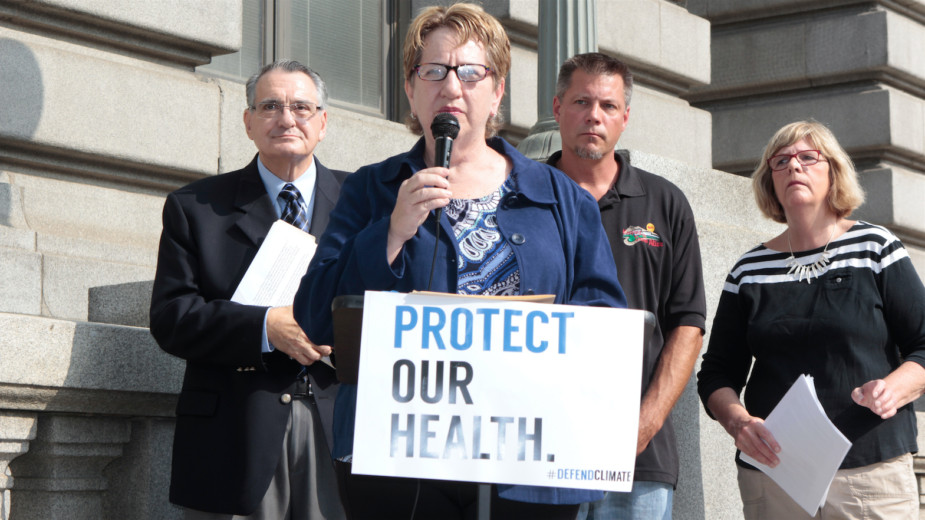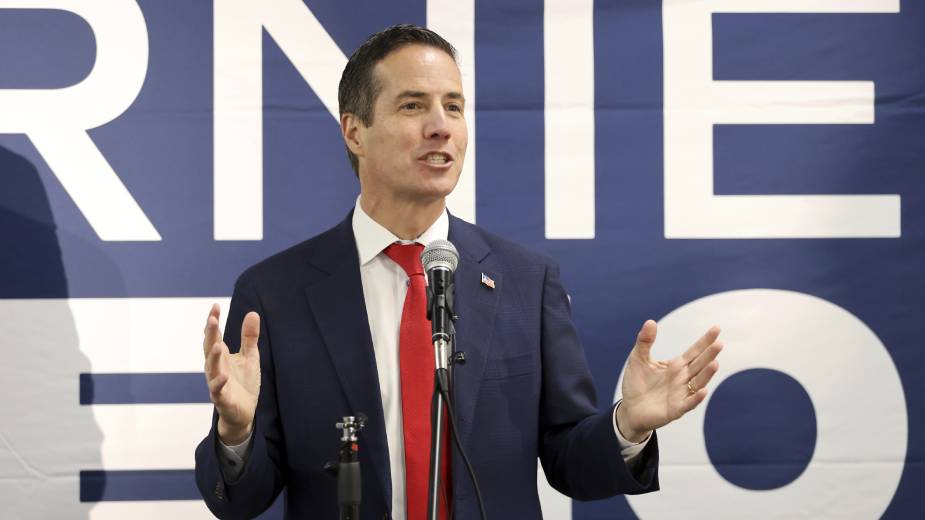Local Group Speaks Out Against Portman Bill
YOUNGSTOWN, Ohio – Four members of Valley Voices United for Change took their opposition to the Regulatory Accountability Act to the steps of the Mahoning County Courthouse Thursday.
The group decried the bill, cosponsored by U.S. Sen. Rob Portman, as a dangerous giveaway to corporations. They called for Portman to hold a town hall meeting in Mahoning Valley to address concerns about the bill.
“That’s how this is going to end up. It’s just going to create a whirlwind for lobbyists and corporations to push their agenda through,” said David Green, former president, UAW 1714.
Portman and Sen. Heidi Heitkamp, a Democrat from North Dakota, introduced the bill in April. The House passed its own version of the bill in January.
According to the bill’s summary, “This bill codifies and revises notice-and-comment rule-making procedures to require federal agencies to consider: (1) whether a rule-making is required by statute or is within the discretion of the agency, (2) whether existing federal laws or rules could be amended or rescinded to address the problem and (3) reasonable alternatives for a new rule.”
Politico has called the bill “the key Republican vehicle to rein in rule-making” in Washington. Opponents of the bill fear it could be the lynch pin of what White House Chief Strategist Steve Bannon has called “the deconstruction of the administrative state.”
Green said the bill’s language is deliberately opaque and sets a dangerous precedent. “I’ve read this legislation. There are 16 pages of very ambiguous language that talks about cost-effective regulation, but safety costs money.”
“Sometimes because of a need for regulation we go overboard,” said Ken Carano, Austintown Township trustee and former state representative. “But the whole idea is to observe those situations, and as you go, amend those situations. This doesn’t amend — it destroys.”
Sen. Portman’s office disputed those characterizations in a written statement to The Business Journal: “It is common sense, bipartisan legislation that simply codifies long-standing, bipartisan executive orders – most of these requirements are not new; they are things agencies do anyway.”
Portman’s office said that the bill would only apply cost-benefit analysis requirements to major rules that would have a $100 million or more affect on the economy each year. That will likely impact around 30 to 40 rules a year, it estimates. The bill will reduce burdensome regulations that impeded job creation and harm small businesses, Portman said in a press release earlier this year.
Portman noted that there’s not been a significant change to the regulatory process since the passage of the Administrative Procedure Act in 1946.
After nearly three decades working in the auto industry, Green fears that the bill could hamper needed safety regulations or roll back existing rules.
“I’ve seen these safety standards over the last 28 years, and the cars have gotten safer. Every year they get safer. That’s because of regulation,” he said.
Green referred to actions taken in the trucking industry where the Trump administration recently dropped efforts to propose new rules for diagnosing truckers and train engineers who might suffer from sleep apnea.
Dietician and health-care advocate Kimberly Kengor said that the bill could also negatively impact the opioid crisis, which President Trump informally declared as a national emergency last week.
“If regulations or protections need to be put into place regarding safety, purity, dosing of opioids and similar products, the ability to put those in place is compromised by this bill because it focuses only on the cost and not the benefit,” she said.
Carano believes that while a rigorous regulatory environment might ultimately cost businesses money, it’s necessary to protect consumers.
“You have to put the pressure on those people who make the final decision in the backroom,” he said. “If this law passes, you’re not going to have that happen anymore because corporations are going to be able to regulate themselves.”
Pictured: Ken Carano, Austintown trustee; Kimberly Kengor, health-care advocate; David Green, former president UAW 1714; Karen Zehr, founding member, Valley Voices United For Change.
Copyright 2024 The Business Journal, Youngstown, Ohio.



